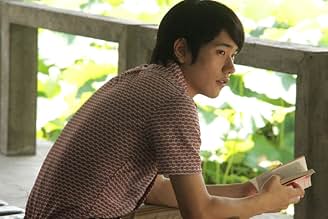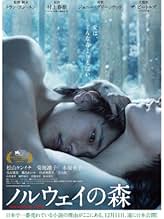Toru se souvient de sa vie dans les années 1960, lorsque son ami Kizuki s'est suicidé et qu'il s'est rapproché de Naoko, la petite amie de Kizuki, et d'une autre femme, l'extravertie et enjo... Tout lireToru se souvient de sa vie dans les années 1960, lorsque son ami Kizuki s'est suicidé et qu'il s'est rapproché de Naoko, la petite amie de Kizuki, et d'une autre femme, l'extravertie et enjouée Midori.Toru se souvient de sa vie dans les années 1960, lorsque son ami Kizuki s'est suicidé et qu'il s'est rapproché de Naoko, la petite amie de Kizuki, et d'une autre femme, l'extravertie et enjouée Midori.
- Réalisation
- Scénario
- Casting principal
- Récompenses
- 4 victoires et 9 nominations au total
- Student Activist
- (as Kohei Yoshino)
Avis à la une
Neo rates it 9/10.
- www.thehkneo.com
So putting aside the various one night stands he benefited from hanging out with casanova Nagasawa (Tetsuji Tamayama), Watanabe has to choose between Naoko (Kikuchi), a girl whom he knows from his younger days when she was the girlfriend of his best friend Kizuki (Kengo Kora) who inexplicably committed suicide, and that of Midori (Kiko Mizuhara putting in a very charismatic performance) who actually had made the first move in getting to know him better, although stopping short of going the full distance given a boyfriend whom we never see on screen.
Depending on your preference and emotional pull toward broad stereotypes of people, the two girls are very much distinct in their personalities, one being an emotional wreck given the loss of Kizuki and spending her time in rehabilitation, which accounted for the many lush, green and white sceneries depending on the calendar month, while the other is a perpetual sunshine, confident, outgoing and attractively lively. It's pessimism versus optimism, although you'd probably understand Watanabe's obligation toward Naoko having spent time growing up together, losing their mutual friend and growing close, not to mention an awkward deflowering process that happened to seal the emotional deal and attachment.
And you wonder if you'd call that love, or attraction even, as opposed to the proposition with another girl who had entered into a crossroads in his life, being stuck in time having to want to care for someone close, versus a new opportunity being presented with Midori's presence. Tran's vision puts one into a deliberately slow paced evaluation as Watanabe struggles to understand his emotional predicament and dilemma presented, where if one doesn't know how to proceed at a forked road ahead, one stalls for time, and stalling is what this film felt like.
But thanks to cinematographer Mark Lee Ping Bin, this allows for plenty of beautiful postcard picturesque shots of the countryside, and many visually stunning captures of emotions of the characters at hand, allowing sensitive, moving moments to come through, and even chances to showcase a long tracking shot set out in the fields which flip flops across the screen as Naoko shares with Watanabe her oft confused state. My favourite however involved that between Watanabe and Midori in a snow filled landscape, cold in scenery but completely filled with the warmth of heart. The cinematography added a boost in the mundane state of characterization, and when things can't move forward, at least your eyes can start to roam at the well crafted technical shots and composition of the film, in addition to the era of the 60s.
The subplots of the rich story tried to muscle its way into the film but ultimately got sacrificed to stay focus on the primary trio, in a tale about finding it tough to let go and move on without being perceived as uncaring. And just when I thought the story had finally found its grounding from which to move off, in comes a deus ex machina moment to help propel it forward, taking off the shine of emotional roller-coaster of the previous two hours, which made it all seem a little futile and a waste. Draw your own conclusions if you will since the film left things unsatisfying open ended, and what you take away from the film, will probably be self reflective. I tried to love this film, but ultimately I can't.
Both book and film are very Japanese. So be prepared for a slow pace, allowing you plenty of time to catch up with its story. Be prepared for a Japanese styling as well. The film also follows the book's plot, more precisely than we are used to in our Western world.
Nou doubt the film 'Norwegian wood' peaks with its acting. Here we talk true Japanese high quality. The unfortunate contrast is made by its disappointing picturing. One can only guess if this is due to a lack of money, or to the desire to apply to 1969-shooting methods.
All in all 'Norwegian wood' is an enjoyable & well made film, allowing you a pleasant evening in the cinema. Those around in 1969 will get themselves carried back to their young days.
Readers of the book will be disappointed because the characters feels too shallow and underdeveloped, while general viewers will leave the cinemas with a big question mark. I won't begin to mention all those small bits of information in the film that are never explained unless you happened to have read the book. That's OK with me by all means, since I have read the book, but either way neither party should be pleased with the film.
The novel "Norwegian Wood" depicts the university days of the main character, Watanabe Tohru. In the novel, he lives in Tokyo, and goes to university. He likes reading American modern literature. He did not have any friends except for one best friend during his high school days, but the friend killed himself at the age of seventeen. Watanabe has several relationships with women between the age of 18 and 21. Some characters in the novel, other than Watanabe's best friend, have also killed themselves. The novel consists of sex, death, literature, and intelligence.
I went to university, and had some close female friends. In addition, I liked reading classic literature. Furthermore, I did not belong to a sport clubs at university, so the scope of my friendship was limited. In essence, I felt a sense of intimacy with Watanabe while reading the novel. (In fact, I learnt "The Catcher in the Rye" by J. D. Salinger and "The Great Gatsby" by F. Scott Fitzgerald from Norwegian Wood, and both books were the first English novels which I completed reading in their original language.) Norwegian Wood is an important book for me, so I was glad to hear, 2 to 3 years ago, that the movie version of this novel would be screened. The movie was released about one week ago, and I went to see it today.
Locations shot in the movie were beautiful, and the music sounds good. In particular, I was moved by one scene in which Reiko sang "Norwegian Wood" by the Beatles with a guitar, and Naoko lost her mental stability during Reiko's performance. In addition, the cast members in the movie were also good, especially Mizuhara Kiko, who played Midori, was very cute and vivid.
Since I have read the novel over and over, and remember the whole story in detail, I can go so far as to say that I do not need any explanation for the story in the movie. Because I know the story, I was purely interested in how the film director, Tran Anh Hung, had expressed the novel through the media of a movie.
The movie version of "Norwegian Wood" was not solely a converted version of the novel, but represented its originality and creativity with the help of movie techniques, such as music, voice (cry, laugh, or angry), facial expression, and scenery.
However, it is certain that those who have never read the novel will not enjoy the movie.
(The above comment is forwarded from my blog at http://metropolitantokyo.blogspot.com/)
Le saviez-vous
- AnecdotesThis is only Jonny Greenwood's second film score, following his acclaimed work on There Will Be Blood (2007). Greenwood was keen to score the film as he was a big fan of the novel. His involvement was in some doubt, however, as Thom Yorke wanted to return to the studios to record a new Radiohead album. Greenwood found the time to balance both projects.
- Citations
Toru Watanabe: Nothing can heal the loss of a beloved. No truth, no sincerity, no strength, no kindness can heal that sorrow. All we can do is live through the sorrow and learn something from it. But whatever we learn will be of no help in facing the next sorrow that comes along.
- Versions alternativesThe German TV version is 10 min shorter.
- ConnexionsFeatured in At the Movies: Venice Film Festival 2010 (2010)
Meilleurs choix
Détails
Box-office
- Montant brut aux États-Unis et au Canada
- 13 000 $US
- Week-end de sortie aux États-Unis et au Canada
- 13 000 $US
- 8 janv. 2012
- Montant brut mondial
- 19 144 719 $US
- Durée2 heures 13 minutes
- Couleur
- Mixage
- Rapport de forme
- 2.35 : 1
Contribuer à cette page



























